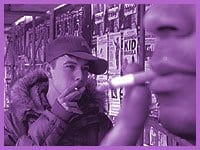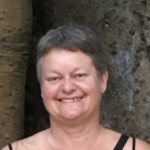Since the 1980s, HIV/AIDS has been the primary health concern in the gay community. But now it seems that tobacco use, so deadly and yet so publicly acceptable, has been overlooked as the bigger threat.
In Ontario, we know that 12,000 people die annually from smoking-related diseases. But how many of them are queer? Statistics say it’s a lot higher than just 10 percent.
A 2001 UCLA survey of 50,000 found that gay men and lesbians were 70 percent more likely to be smokers than heterosexuals were. A report published by the Ontario Tobacco Research Unit in that same year found smoking rates among gay youth are at 38 to 59 percent compared with 28 to 35 percent for heterosexuals, and up to 50 percent among gay adults compared with 28 percent for the rest of the population.
In the US the issue of queers smoking has reached a much greater level of awareness than it has here.
“The gay community faces discrimination, but not from cancer, heart disease or emphysema,” reads a California health department anti-smoking ad, part of a campaign targeting queers launched last summer.
Smoking cessation support groups like The Last Drag in San Francisco and Bitch To Quit in Chicago are helping queers kick the habit. In Seattle, Elise Lindborg runs the Gay American Smoke Out, an on-line resource and call to action.
“I wanted to spread the word that we too need help in quitting smoking,” says Lindborg, a former smoking prevention worker who launched the website because she was frustrated with the lack of support for queers ready to quit. “About three years ago there wasn’t anything, but people are starting to realize it’s a big problem.”
So far it seems Toronto is lagging behind. Although the Centre For Addiction And Mental Health’s (CAMH) Rainbow Services program offers other queer-specific addition recovery programs, currently smokers are being referred on to the centre’s Nicotine Dependence Clinic.
“At the moment there isn’t an LGBT smoking cessation program,” confirms Farzana Doctor at CAMH’s Rainbow Services. “But it’s something that is being talked about because there are higher rates.”
Toronto Public Health is also aware of the disproportionate smoking stats, but isn’t aware of programs specifically designed to help homos quit.
And yet, between the bitter winter weather and the looming anti-smoking by-law, the incentive for Toronto queers to quit has never been greater.
“We’re being forced out,” says local queer Robert Rachon, who lit his last cigarette two weeks ago. “Soon we can’t smoke in a bar. For me, the campaign is working.”
After Jun 1, there will be no smoking in bars and restaurants unless there is a designated smoking room with recycled air. This deadline, dreaded by many smokers and bar owners alike, will mark the final stage of a Toronto-wide campaign to stop smoking indoors in public places.
(The Toolbox is the only gay bar that won’t be affected by the Jun 1 deadline; it’s been smoke-free for four years and has already experienced a shift in clientele.)
But quitting isn’t easy. “Last year I tried to quit using Zyban but it didn’t work for me,” says Rachon, who’s currently on the patch. “I like to smoke but the cost is so great. It’s over $8 a pack. Add that up in a week, a month, a year and it’s a lot of money.
“My main reason for quitting is health. I quit two weeks ago because I promised my daughter.” As a reward for quitting, Rachon and his partner David Adkin, a non-smoker, have joined a new gym.
Black Eagle security person Gary Danyluk says he’s noticed an improvement in his health since he started working in the non-smoking section of the bar. He has fewer headaches and feels better overall. “I sleep better after working in a non-smoking environment. I don’t have dry throat after work or the next morning.”
So far quitting himself isn’t on the agenda, but “I’ve heard that two of four other doormen are planning on quitting because of the new law, using it as incentive.”
* Smoking cessation clinics can be found by dialing the Centre For Addiction And Mental Health (CAMH) at (416) 535-8501 ext 6019, Toronto Public Health at (416) 338-7600 or the Canadian Cancer Society’s Smokers’ Helpline at (877) 513-5333. For more information on the Gay American Smoke out check out Gaysmokeout.net.


 Why you can trust Xtra
Why you can trust Xtra


